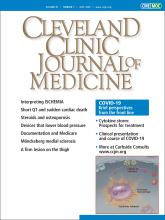Index by author
July 01, 2020; Volume 87,Issue 7
Seegobin, Karan
- You have accessMönckeberg medial sclerosisAnthony Stack, DO, Sandra Sheffield, DO, Karan Seegobin, MBBS and Satish Maharaj, MBBSCleveland Clinic Journal of Medicine July 2020, 87 (7) 396-397; DOI: https://doi.org/10.3949/ccjm.87a.19085
A man with chronic kidney disease presents with pain and ulceration of the fingers.
Sheffield, Sandra
- You have accessMönckeberg medial sclerosisAnthony Stack, DO, Sandra Sheffield, DO, Karan Seegobin, MBBS and Satish Maharaj, MBBSCleveland Clinic Journal of Medicine July 2020, 87 (7) 396-397; DOI: https://doi.org/10.3949/ccjm.87a.19085
A man with chronic kidney disease presents with pain and ulceration of the fingers.
Shokr, Mohamed
- You have accessDoes a short QT interval increase the risk of cardiac death in healthy people?Ahmed Subahi, MD, Ahmed S. Yassin, MD, Oluwole Adegbala, MD, Mohamed Shokr, MD and Luis Afonso, MDCleveland Clinic Journal of Medicine July 2020, 87 (7) 398-400; DOI: https://doi.org/10.3949/ccjm.87a.19090
No, but it may warrant further investigation to determine if the patient is at risk.
Spilias, Nikolaos
- You have accessThe role of ISCHEMIA in stable ischemic heart diseaseNikolaos Spilias, MD, Benjamin Zorach, MD, Kara Denby, MD and Stephen Ellis, MDCleveland Clinic Journal of Medicine July 2020, 87 (7) 401-409; DOI: https://doi.org/10.3949/ccjm.87a.20033
Decisions regarding treatment of stable ischemic heart disease must remain individualized.
Stack, Anthony
- You have accessMönckeberg medial sclerosisAnthony Stack, DO, Sandra Sheffield, DO, Karan Seegobin, MBBS and Satish Maharaj, MBBSCleveland Clinic Journal of Medicine July 2020, 87 (7) 396-397; DOI: https://doi.org/10.3949/ccjm.87a.19085
A man with chronic kidney disease presents with pain and ulceration of the fingers.
Subahi, Ahmed
- You have accessDoes a short QT interval increase the risk of cardiac death in healthy people?Ahmed Subahi, MD, Ahmed S. Yassin, MD, Oluwole Adegbala, MD, Mohamed Shokr, MD and Luis Afonso, MDCleveland Clinic Journal of Medicine July 2020, 87 (7) 398-400; DOI: https://doi.org/10.3949/ccjm.87a.19090
No, but it may warrant further investigation to determine if the patient is at risk.



